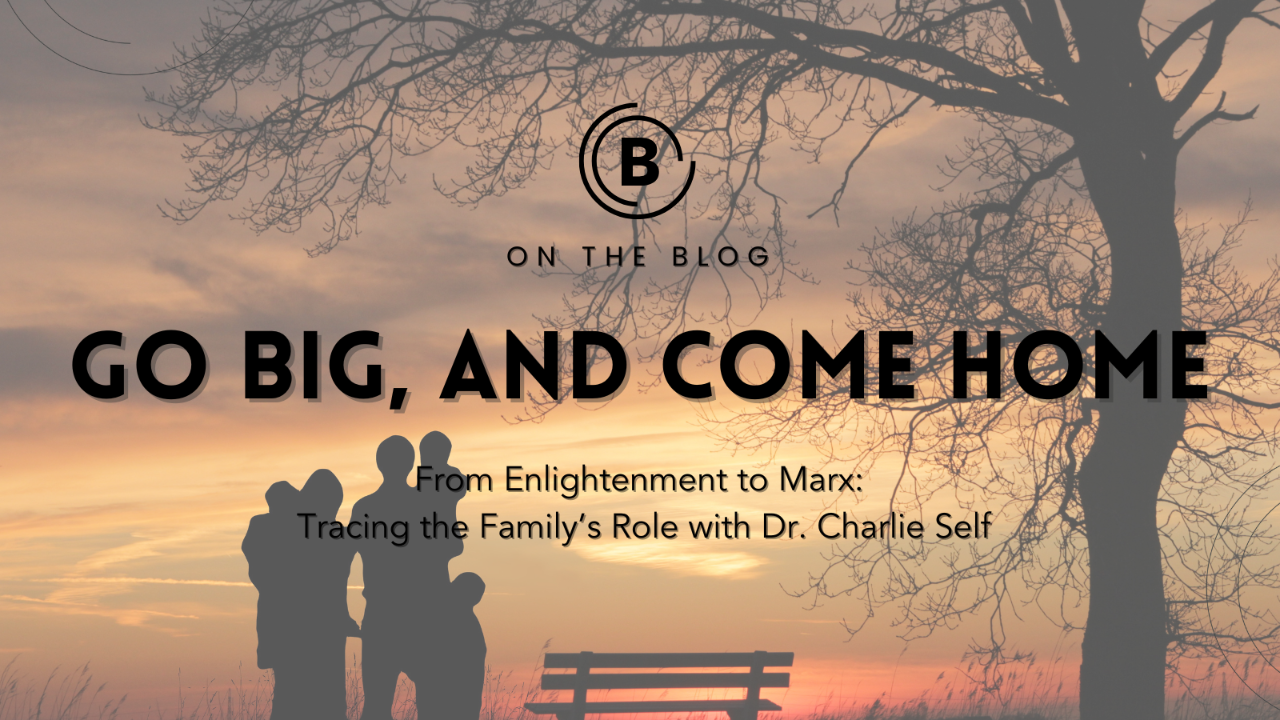Go Big, and Come Home
Aug 25, 2025
From Enlightenment to Marx: Tracing the Family’s Role with Dr. Charlie Self
In a recent conversation, I interviewed Dr. Charlie Self, and we delved into the historical and philosophical shifts in views on the family, from the pro-family stances of Enlightenment thinkers to the Marxist critique of family as a capitalist construct. Our discussion, rich with historical insights and modern implications, explored the decline of traditional family structures, the church’s role, and the challenges facing families today. This short article is not a substitute for the podcast but Cliff Notes on which you can hang your thinking as you listen.
The context for this conversation is threefold:
-
A recent Blog and podcast I recorded on Generation O: the strategy to mass-orphanize a generation (https://www.brettjohnson.biz/blog/generation-o)
-
The increased polarization in society fueled by algorithms and ideologies: is this something new, or is it as old as the hills?
-
The repentance needed by the Boomer generation for the ways in which they contributed to the present-day feelings of hopelessness among NewGen/Generation O.
With that as background, I have been giving thought to the source of these things, and Charlie offers a historical perspective that gives us reason to think deeply.
Enlightenment Thinkers: Champions of the Family
The Enlightenment, spanning the 17th and 18th centuries, celebrated reason, liberty, and the family as a cornerstone of society. Dr. Self and I discussed how thinkers like John Locke, Jean-Jacques Rousseau, and Charles Montesquieu viewed the family as a natural, voluntary unit essential for nurturing virtuous citizens and preserving social order. Locke saw marriage as a consensual compact for mutual support and child-rearing, laying the foundation for individual rights. Rousseau emphasized the family’s role in moral education, while Montesquieu tied it to the stability of various government forms. Charlie Self highlighted religious movements like the Bohemian Brethren, Moravians, and Methodists, which reinforced the family’s importance, alongside figures like Bishop Comenius (the father of modern education) in the 1600s, who championed nurturing children within biological families. This pro-family ethos, rooted in the concept of subsidiarity, positioned the family as the primary unit for fostering human dignity and agency.
We dug into the connection to business and property ownership and how children were grown into fellow-owners of family businesses.
The Marxist Shift: Family as a Capitalist Tool
Our conversation turned to the 19th century, where Karl Marx and Friedrich Engels reframed the family through historical materialism. In works like The Communist Manifesto and The Origin of the Family, Private Property, and the State, they argued that the family evolved with economic systems, culminating in the bourgeois family under capitalism—a tool for perpetuating private property and class oppression. Marxists saw monogamy as ensuring legitimate heirs, relegating women to domestic labor, and described the rise of male dominance as a “world-historical defeat of the female sex.” We noted how this distorted Enlightenment ideas, rejecting the family’s spiritual and social value as bourgeois ideology, setting the stage for modern anti-family sentiments. “Marx is part of the unholy trinity of Marx, Darwin and Freud.” Marx envisioned a classless, materialistic society with no place for spirituality or the family. He hated the Methodist revivals, private ownership and the family. In places where economic development had flourished Marxism did not do well. What you have with Marxism is a secular version of the kingdom of God. The breaking of nuclear family bonds increases the need for government or bureaucratic interventions.
The Challenges of the Present Generation
“This is a new and accelerating phenomenon from the 1960s.” We then explored the disintegration of traditional family structures over recent decades, accelerated by the Boomer generation’s prosperity in the 1960s that gave them time to think about issues. A second factor was the separation of sex from reproduction and fueled individualism. “The environmental crisis is still the overarching crisis that is used as a weapon against individuality, family and free markets.” We go into this is in some detail.
A third thing Charlie touched on is what he referred to as “the Leviathan of public agencies.” I raised the topic of ruling or technocratic elites which Woodrow Wilson amplified and Charlie shared good insights on “the tyranny of the expert.”
Increased government intervention, Dr. Self noted, often undermined family autonomy. This trend, echoing Marxist collectivism, lacks tools to build enduring alternatives, leaving younger generations hesitant about marriage and childbearing amid environmental and economic pressures.
Balancing Individualism and Community
We discussed the tension between individualism and collectivism, with Dr. Self advocating for a balanced approach that respects personal freedom while fostering community through spiritual “fathering and mothering.” He distinguished between the equality of individuals before God and legitimate functional authority, a nuance often lost in modern rejection of hierarchy. I echoed his call for repentance from past mistakes and the creation of welcoming spaces that empower individuals within supportive communities. Local initiatives, grounded in biblical and anthropological truths, emerged as a key source of hope for rebuilding functional families and societies.
Conclusion: A Path Forward
My interview with Dr. Charlie Self illuminated the family’s enduring significance, from its Enlightenment roots as a nurturing institution to its contested status in modern ideologies. By revisiting biblical principles, embracing local initiatives, and leveraging tools like AI, we see a path to restoring hope and dignity to families and communities. Our discussion challenges us to rethink the family’s role in shaping a virtuous, resilient society, grounded in faith and action. Hopefully, the conversation sheds light on the historical roots of our current societal predicament and prompts us to empathy and action. “When we yield to the kingdom of God... we have to find community.”
“Let’s build a world of fathering and mothering that is empowering and not controlling, that is bringing the best of lifelong learning while being open to the new insights of the very people we are mentoring.”

